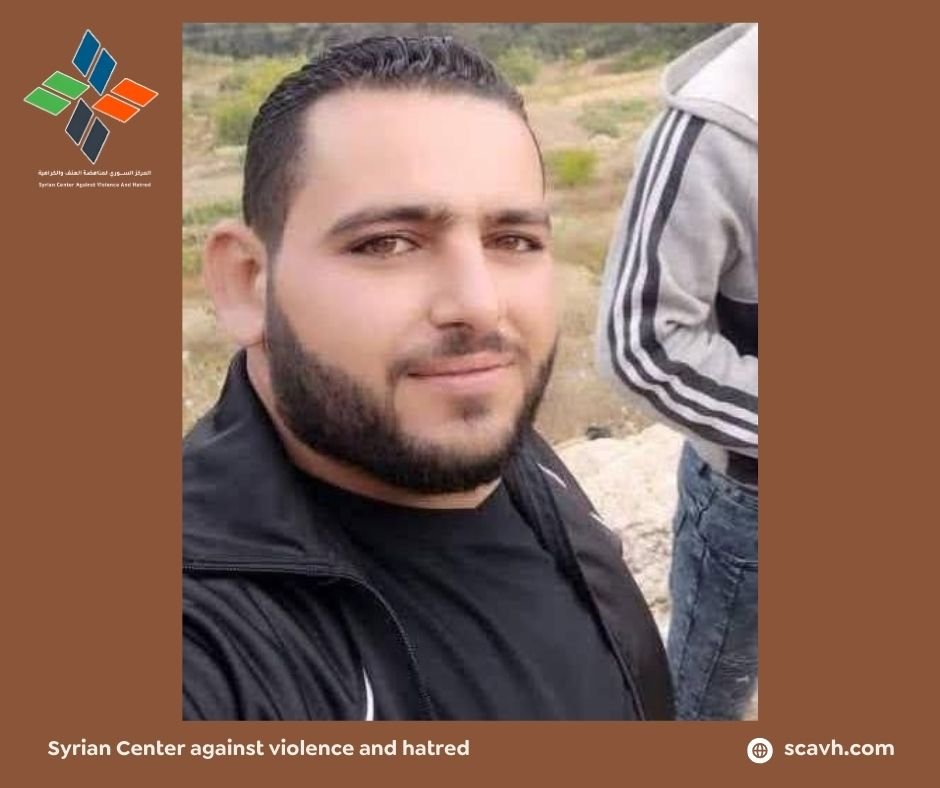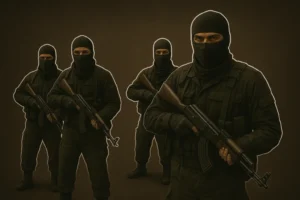Prepared by the Center for Countering Violence and Hatred
Extremist factions stationed in the village of Qarfaïs in the countryside of Jableh, on the Syrian coast, have suppressed all forms of life since March 6, 2025, up to the present day, May 5, 2025, and have committed a massacre in the village that claimed the lives of 29 people. The crimes continue unabated.
Release Date: May 2025
Documentation Type: Investigative documentation report based on direct testimonies from victims’ families
Crime Classification: Crime against humanity, extrajudicial killing, sectarian persecution, failure of authorities to protect civilians
Legal Reference: Article 7 of the Rome Statute of the International Criminal Court
Location: Qarfaïs village in the Syrian coast – Jableh countryside
Victims: 29 people in a mass massacre
Despite two months having passed since the massacre of 29 people in Qarfaïs, the residents remain under the control of extremist factions that dominate the village and continue to commit both individual and mass violations against the villagers, while transitional authorities have failed to provide protection or safety.
A sectarian massacre also occurred in the village of Qarfaïs, claiming the lives of 29 civilians, including entire families—fathers and their children. According to our findings and eyewitness accounts, the massacre was committed by convoys coming from the direction of Baniyas. Part of the convoy stationed inside the Al-Sinn Spring, which supplies water to the Syrian coast, after which water was cut off from the coastal region. Though the reason remains unclear, villagers accuse the faction of being behind the cut as part of a collective punishment policy.
The convoy headed to Qarfaïs, where a shrine for a prominent Alawite religious figure, Sheikh Ahmad of Qarfaïs, is located. The shrine was desecrated, and the convoy then proceeded to the home of sports journalist Aksam Douba, owner of “Al-Riyadiya” newspaper and cousin of General Ali Douba, a well-known Assad regime figure in the 1980s and 1990s. Aksam Douba and two of his employees were killed at his home.
In Qarfaïs, 29 civilians were killed on a sectarian basis, including two elderly men in their seventies—Mohsen Abboud and Fouad Maalla—and a 67-year-old man, Yasser Suleiman, who was killed alongside his two sons, Ammar and Ahmad. The village also witnessed the burning of several homes and the theft of vehicles.
Following that, elements of the Ministry of Defense were stationed in the village. While no widespread violations or systematic violence were recorded during their presence—except for the massacre on March 7—we did document verbal abuse and arbitrary detentions of residents.
However, in the past ten days, violations have intensified, with masked individuals—whose identities remain unclear—committing numerous acts of intimidation.
Villagers report that those individuals looted both the primary and secondary schools, smashed their contents, and did the same to the post office, health center, municipality, oyster mushroom farm, and the sewing workshop, stealing solar energy systems from the latter two.
One witness said, “They break into any empty house and loot it, and if there’s nothing to loot, they destroy it so it’s no longer livable.” He added that the olive season requires land cleaning now, “but anyone who goes out to the fields is basically giving up their life,” indicating the villagers’ fear.
Rising fears after murder
Fears increased after the murder of the young man “Hassan Yousef,” who disappeared on May 28, 2025, and was found dead two days later. According to the center’s monitoring, the village has experienced displacement since then—some moved to relatives’ homes in nearby villages, others rented in the city.
Despite the presence of a primary school, parents fear sending their children. A woman from the village said: “If we adults don’t dare leave our homes, how can we send our children? The faction’s vehicles drive recklessly through the roads, endangering civilians. Who would dare let their child go outside?”
We also documented testimonies of gunfire at a man on a motorbike traveling from Al-Aqeiba to Zahraa through Qarfaïs. Witnesses stated the shots came from a house occupied by elements linked to transitional authorities. They identified the house as belonging to Dr. Ahmad Saif al-Din Abdul Karim, which was seized by the authorities and turned into a base for their personnel.
Armed men affiliated with transitional authorities have forcibly taken over three private properties in the village: “Jar Al-Qamar” restaurant, the home of Abdullah Douba, and the home of Ahmad Saif.
On April 19, 2025, a young man from a nearby village was kidnapped while visiting his uncle in Qarfaïs. He was taken to their base in “Jar Al-Qamar” restaurant, where he was physically tortured. He was found two days later dumped near Al-Asaliyya neighborhood in Jableh city.
Terrorizing residents… Arrest, torture, and threats of death for speaking to the media
During the preparation of this report, we spoke to two witnesses who were arbitrarily arrested and tortured. One of them, after returning from disappearance, claimed he wasn’t kidnapped due to death threats from his captors if he spoke out. He agreed to speak only on the condition of anonymity and confirmed he was kidnapped from the village and severely beaten. Another witness said he was kidnapped along with his son.
On April 27, young man “Hassan Abdulhadi” was kidnapped from the village at 7 PM. The next day, his body was found in a field bearing signs of torture and strangulation.

Additionally, elements affiliated with or linked to transitional authorities patrol the village at night, firing gunshots and looting homes and properties.
Even the well-known religious shrine in the village—“Maqam Sheikh Ahmad in Qarfaïs”—which usually hosts visitors, charitable work, and aid distribution, is now deserted. Only one person remains who visits it daily.
Despite residents’ pleas for intervention, transitional authorities have not responded or conducted any investigations into the recent events in the village, including killings, kidnappings, or thefts.
Villagers renew their calls for intervention and for the authorities to fulfill their duties in protecting their citizens, a responsibility they have failed to meet since March 6, 2025, until today.


